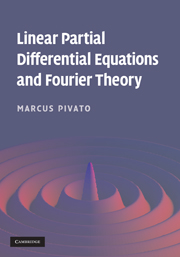Book contents
- Frontmatter
- Contents
- Preface
- What's good about this book?
- Suggested 12-week syllabus
- Part I Motivating examples and major applications
- 1 Heat and diffusion
- 2 Waves and signals
- 3 Quantum mechanics
- Part II General theory
- Part III Fourier series on bounded domains
- Part IV BVP solutions via eigenfunction expansions
- Part V Miscellaneous solution methods
- Part VI Fourier transforms on unbounded domains
- Appendix A Sets and functions
- Appendix B Derivatives – notation
- Appendix C Complex numbers
- Appendix D Coordinate systems and domains
- Appendix E Vector calculus
- Appendix F Differentiation of function series
- Appendix G Differentiation of integrals
- Appendix H Taylor polynomials
- References
- Subject index
- Notation index
3 - Quantum mechanics
Published online by Cambridge University Press: 05 June 2012
- Frontmatter
- Contents
- Preface
- What's good about this book?
- Suggested 12-week syllabus
- Part I Motivating examples and major applications
- 1 Heat and diffusion
- 2 Waves and signals
- 3 Quantum mechanics
- Part II General theory
- Part III Fourier series on bounded domains
- Part IV BVP solutions via eigenfunction expansions
- Part V Miscellaneous solution methods
- Part VI Fourier transforms on unbounded domains
- Appendix A Sets and functions
- Appendix B Derivatives – notation
- Appendix C Complex numbers
- Appendix D Coordinate systems and domains
- Appendix E Vector calculus
- Appendix F Differentiation of function series
- Appendix G Differentiation of integrals
- Appendix H Taylor polynomials
- References
- Subject index
- Notation index
Summary
[M]odern physics has definitely decided in favor of Plato. In fact the smallest units of matter are not physical objects in the ordinary sense; they are forms, ideas which can be expressed unambiguously only in mathematical language.
Werner HeisenbergBasic framework
Prerequisites: Appendix C, §1B(ii).
Near the beginning of the twentieth century, physicists realized that electromagnetic waves sometimes exhibited particle-like properties, as if light were composed of discrete ‘photons’. In 1923, Louis de Broglie proposed that, conversely, particles of matter might have wave-like properties. This was confirmed in 1927 by C. J. Davisson and L. H. Germer and, independently, by G. P. Thompson, who showed that an electron beam exhibited an unmistakable diffraction pattern when scattered off a metal plate, as if the beam were composed of ‘electron waves’. Systems with many interacting particles exhibit even more curious phenomena. Quantum mechanics is a theory which explains these phenomena.
We will not attempt here to provide a physical justification for quantum mechanics. Historically, quantum theory developed through a combination of vaguely implausible physical analogies and wild guesses motivated by inexplicable empirical phenomena. By now, these analogies and guesses have been overwhelmingly vindicated by experimental evidence. The best justification for quantum mechanics is that it ‘works’, by which we mean that its theoretical predictions match all available empirical data with astonishing accuracy.
- Type
- Chapter
- Information
- Linear Partial Differential Equations and Fourier Theory , pp. 39 - 58Publisher: Cambridge University PressPrint publication year: 2010



